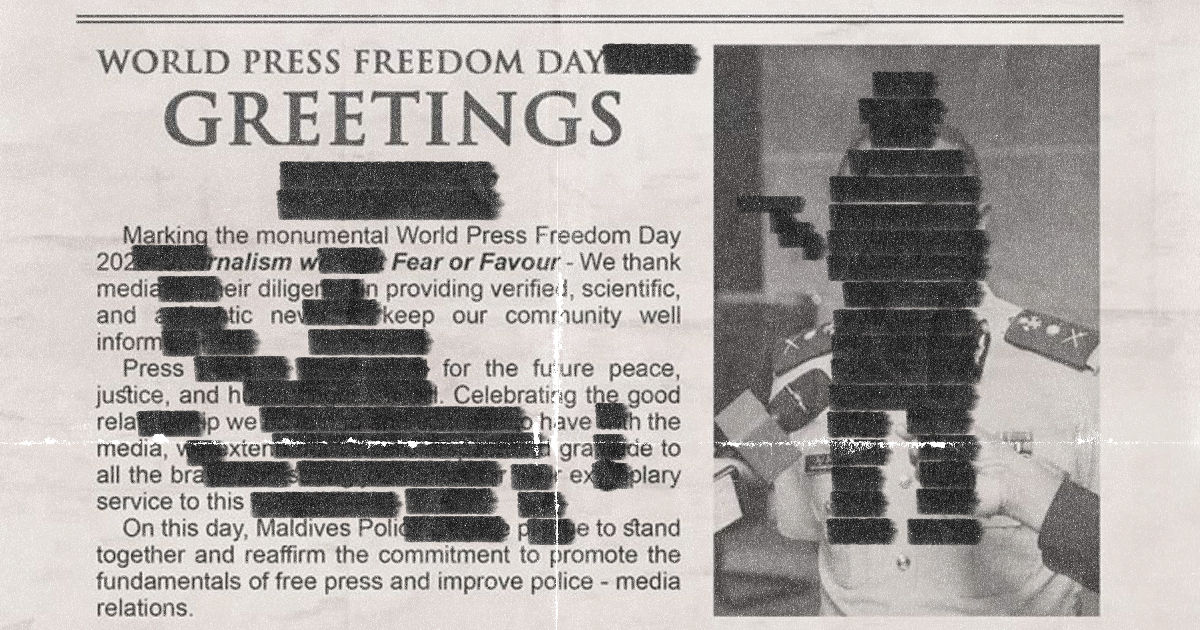Secret phone calls and economic pressures undermine Maldives media
President Muizzu isn’t above ringing journalists directly.

Artwork: Dosain
08 May 2025, 17:29
It was around 7pm during the middle of Ramadan. Hussain Fiyaz Moosa, a prominent Maldivian journalist and editor of Adhadhu news, had just finished the maghrib prayer and was sitting down with his family when his phone rang.
President Mohamed Muizzu’s contact was flashing on his phone screen.
“I did not answer at first. I took a few seconds, wondering why,” Fiyaz said of his initial surprised reaction.
“He asked, ‘Is it Fiyaz?’ I said yes and then he just went off. From his tone and voice I understood that he was very angry. He repeated three times that he will take strict action against us,” Fiyaz said.
As editor of Adhadhu news, one of the more adversarial media outlets that has been highly critical of the current government, receiving a threatening phone call was not unusual for Fiyaz.
“We get calls with threats or intimidation, even before when I was at Raajje TV. But the difference this time was that it was from the president and I did not know what it was about,” he said. “My first reaction was that maybe a journalist had tweeted something, as I knew we had not published anything at the time,” Fiyaz told the Maldives Independent.
President Muizzu’s anger was over reports that during an opposition rally in Malé, an MDP activist had claimed that a ban on vape devices was implemented in late 2024 because Muizzu’s young son had been caught vaping.
However, Adhadhu had not reported the allegation at all.
“That was what surprised me,” said Fiyaz. “I really thought maybe [an Adhadhu journalist] had tweeted something. But no one had tweeted anything. The first we reported about these accusations was a story about the education ministry condemning it,” Fiyaz said.
The Maldives Independent talked to a dozen journalists from 10 different mainstream news organisations, none of whom were surprised when they heard about the president’s phone call.
“Muizzu calls editors. Sometimes even journalists, when he is unhappy about a news story or something related to reporting. It is not unusual,” an editor of a leading news outlet said.
It was especially common when he was the mayor of the Malé City Council, but has continued into his presidency, according to the journalists who did not want to be named. They said they were fearful of repercussions in an environment where a lot of media outlets depend on state-owned enterprises for advertising revenue.
“Sometimes it is about very basic things. He might call to complain because his photo was used for a story that was negative or critical of something happening in the country,” one journalist explained.
Sometimes, the demands are to change articles or completely remove them.
“If he is unhappy about something, he will call. Sometimes to change part of a story or to demand that the article be removed,” another editor said.
One veteran journalist with over a decade of experience said the president had phoned him several times to accuse him of reporting "lies".
“This was more common when he was the mayor. Any negative story is enough reason for a call. We used to joke when publishing such stories that I am waiting for the mayor to call,” the journalist said. “He would be agitated and annoyed and say ‘All lies. Nothing but lies’ and demand to change the story.”
Fiyaz reported the call to the police as a threat, and the Maldives Journalists Association called for a transparent investigation. The International Federation of Journalists (IFJ) also raised concerns, asking the President’s Office to “publicly clarify this situation.”
Muizzu appeared shy in dealing with the press publicly, holding no press conferences for more than 500 days since a press conference in December 2023. That policy of silence changed abruptly last Saturday on World Press Freedom Day, when he hosted a 15-hour marathon press briefing – a world record, ahead of Ukraine’s Volodymyr Zelenskyy (14 hours) and Alexander Lukashenko of Belarus (seven hours).
During the press conference, journalists confronted Muizzu about the threatening phone call. He admitted he had called Fiyaz, but denied having made any threats.
“I called that day as I also somewhat knew him from before [I was President],” Muizzu explained. “I said politely that I dislike attempts made to tarnish the reputation of my children with false information, and that I did not think it was okay. I did not make any threats,” he insisted.
Pressed by reporters, he said “for the purposes of argument” that implying he would take legal action against Fiyaz did not constitute a threat.
Muizzu claimed he had information from three sources warning him that Adhadhu was planning to write a story about the vape allegations against his son, prompting him to preemptively talk to Fiyaz.
“I got information from three different people connected to [Adhadhu], that these things [the allegations against Muizzu's son] are being organised by you. I decided to call him as I knew him a bit, to tell him this was not okay before anything got published,” Muizzu said.
Following the denial, Fiyaz called into the press conference through a journalist’s phone to confront Muizzu. He reiterated that the president had repeated three times that he would take action.
“That is not how it happened,” Muizzu repeated.
Nearly a week after Fiyaz’s police report, the Prosecutor General issued a statement confirming the matter had been dropped as there were “no grounds to pursue criminal charges.”
The President’s phone calls to journalists echo the extent to which the executive has sought to exercise control over the Maldives media during the last decade.
In February 2024, a journalist’s resignation letter exposed the level of political control of Mihaaru, one of the leading media outlets and the only printed newspaper in the country.
When journalist Moosa Rasheed quit Mihaaru news, his five-page-long resignation letter was leaked online in which Moosa details how the Mihaaru newsroom had lost editorial control as owners and editors succumbed to economic pressure from the government. Three sources from Mihaaru confirmed to the Maldives Independent the authenticity of the letter.
Moosa, who covered politics and parliament, said he was quitting due to widespread political influence over the editorial policy of Mihaaru. His complaints includes: editors insisting journalists not cover politically critical stories; changing stories to show the government in a positive light; editors deleting or removing stories seen to be critical of the government; compelling journalists to withdraw right to information requests by threatening their jobs; editing articles on social issues by inserting lines that praised the government; and trying to obfuscate the economic situation of the country by spinning economic and financial stories.
He also said that in at least one instance a senior journalist was removed from her assigned beat after complaints from the President’s Office spokesperson Heena Waleed, about a post on X in which the journalist criticised her for not providing information to journalists.
Moosa said his concerns were widely shared by colleagues at Mihaaru and that editors also agreed with their concerns during internal meetings.
“Editors do not respect the reporting done by journalists, instead prioritising the interests of politicians. When journalists report on stories critical of government policies, before being published on Mihaaru the stories are changed so that the public is blamed instead of policies. Senior editors have told me and other journalists that the president directly calls and orders them to change stories and comments,” Moosa said.
According to Moosa’s letter, Mihaaru’s reasons for capitulating to the Muizzu administration were economic.
“In a meeting with an editor and HR, I told them that due to the current situation, it was impossible to report in-depth on any political issue. They accepted this. But instead of giving guarantees that the situation will improve, they told me that the financial situation could get worse in the future,” he wrote.
“As the presidential election approaches and the political landscape gets more heated, I believe that the government’s attempts to control the largest mainstream media in the country will only increase. I believe that the management and some editors at Mihaaru are not ready to put a stop to these influences,” he added.
Moosa alleged that Vaail Mohamed Zahir Hussain, owner of Mihaaru was under pressure due to the news outlet's financial situation and he was in turn pressuring the editors.
Vaail declined to comment when the Maldives Independent contacted him.
Moosa declined to comment on the letter or his time at Mihaaru. He is now working on setting up a new media startup, Citizen.
The Maldives last week ranked 104th out of 180 countries in the updated World Press Freedom Index, a climb of two places on the previous year. Reporters without Borders (RSF), which compiles the index, has pointed to the economic control of the Maldives media as a key threat to press freedom. Out of the five indicators used to rank countries on the RSF press freedom index, the Maldives has consecutively scored lowest on the economic indicator.
“Since 2018, the allocation of government subsidies and advertising from state-owned companies has been weaponised by the government and used to undermine the financial viability of independent outlets or outlets close to the opposition,” RSF said.
RSF notes that in return for the funds, “editors are told to remove articles that displease or not to cover a sensitive subject.”
Discussion
No comments yet. Be the first to share your thoughts!
No comments yet. Be the first to join the conversation!
Join the Conversation
Sign in to share your thoughts under an alias and take part in the discussion. Independent journalism thrives on open, respectful debate — your voice matters.




